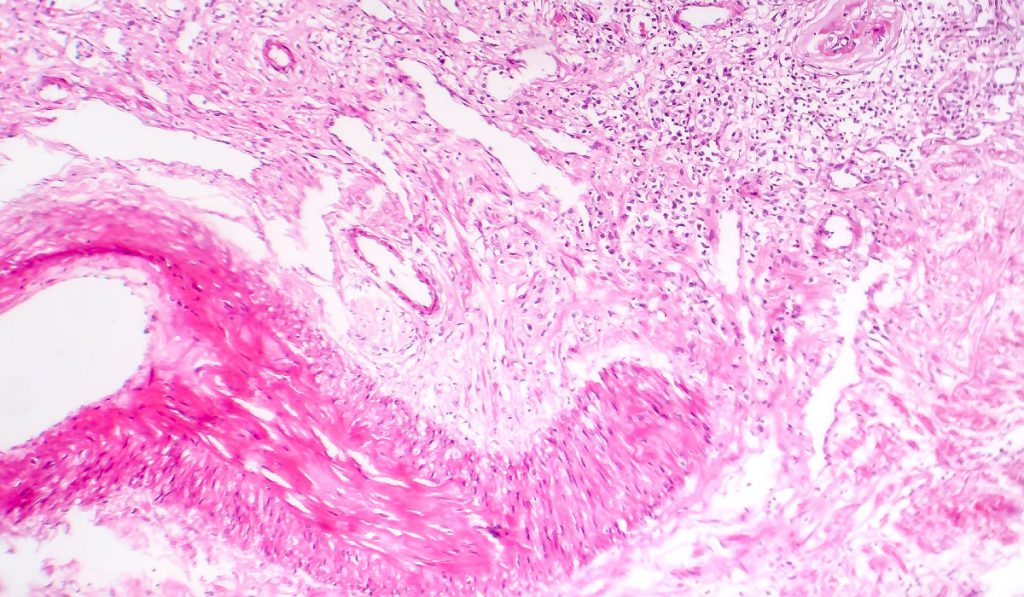Diabetic nephropathy and its connection to end-stage renal disease (ESRD) represent an increasing global health concern, with over 40 percent of new incident cases of ESRD attributable to diabetes in the United States. The incidence of ESRD secondary to type 2 diabetes is no longer considered less common than with insulinopenic type 1 diabetes. In the United States, the demographics of ESRD secondary to type 2 diabetes mirror the overall prevalence of type 2 diabetes in population groups including women, African Americans, Hispanic Americans, Native Americans and Asian Americans.
Through one of the largest multi-laboratory research programs in the country, researchers affiliated with the Vanderbilt Center for Kidney Disease are investigating the underlying pathogenic mechanisms of ESRD related to diabetic nephropathy, as well as novel therapeutic options.
“Nephrology research at Vanderbilt is focused on understanding mechanisms of kidney injury and developing and testing new therapies to help our patients with both acute and chronic kidney diseases,” said Raymond C. Harris, M.D., Ann and Roscoe R. Robinson Chair in Nephrology and Chief of the Division of Nephrology and Hypertension at Vanderbilt. “Because diabetic nephropathy is a major cause of progressive kidney disease, much of our research efforts are directed toward it.”
Research Highlights
Highlights of current research underway at Vanderbilt include:
- Collagen IV assembly: The Bhave laboratory under the direction of Jay Bhave M.D., Ph.D. is investigating normal collagen IV assembly and its dysregulation in diabetic nephropathy. Having discovered a novel role for peroxidasin to mediate collagen IV subunit assembly, the research team is using a combination of in vivo and in vitro techniques to investigate alterations in diabetic nephropathy.
- Glomerulosclerosis: The Fogo laboratory under the direction of Agnes Fogo M.D. investigates underlying mechanisms mediating progressive glomerulopathy in diabetes. Key discoveries include new insights into the role of PAI-1 and TGF-β in progressive glomerulosclerosis.
- Pathogenesis and treatment: The Harris laboratory under the direction of Raymond Harris M.D., Ph.D. has developed mouse models that more closely approximate human diabetic nephropathy and are testing innovative therapeutic interventions. The Harris lab further collaborates with other Vanderbilt labs on proteomic analysis of diabetic kidneys using MALDI-IMS.
Collaborating with the Harris laboratory, the Zhang laboratory under the direction of Ming-Zhi Zhang M.D. is studying underlying mechanisms of diabetic nephropathy and potential novel therapies. Recent discoveries include an important role for the intrarenal dopaminergic system to retard progress of diabetic nephropathy. The lab is also investigating the role of the epidermal growth factor system in mediating progression of diabetic nephropathy. - Matrix modifications: The Hudson laboratory under the direction of Billy Hudson Ph.D. is investigating underlying mechanisms mediating matrix abnormalities in diabetic nephropathy, in particular the role of diabetes-induced matrix modifications in progression of the disease. This research has led to development of a new therapeutic agent, pyridorin.
- Glomulerular cell function: The Pozzi laboratory under the direction of Ambra Pozzi Ph.D. is investigating how interactions between glomerular cells and the surrounding matrix control matrix homeostasis and participate in the initiation and progression of diabetic glomerulosclerosis.
- Endothelial dysfunction: The Takahashi laboratory under the direction of Takamune Takahashi M.D., Ph.D. is investigating the role of endothelial dysfunction in diabetic nephropathy, in particular the role of endothelial nitric oxide synthase dysfunction. In collaboration with the Harris laboratory, the Takahashi laboratory has developed targeted eNOS-deficient mice to better model disease progression.
- Advanced proteomics: The Vanacore laboratory under the direction of Roberto Vanacore Ph.D. is utilizing state-of-the-art proteomic methodologies to investigate underlying mechanisms of progressive glomerulopathy in diabetic nephropathy, including abnormalities in collagen IV synthesis and post-translational modification.
Future Avenues of Research and Innovation
Harris and colleagues are looking into near-and long-term clinical applications of the research underway in Vanderbilt’s program. “It is our hope that discoveries made in laboratories here at Vanderbilt will have direct impact on the treatment of our patients with diabetic kidney disease,” Harris said.





